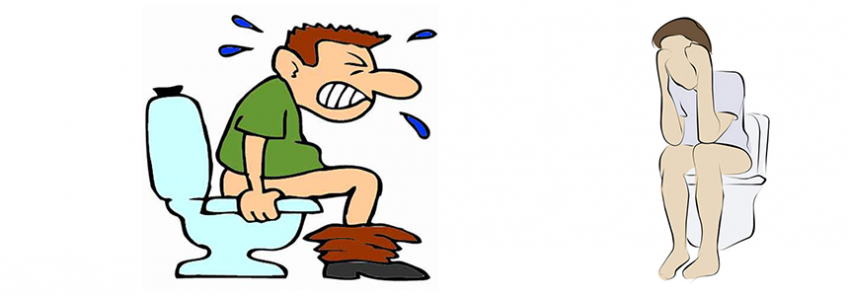Constipation

Constipation is a common problem related to your bowel movement, when the stool is too hard, difficult to get out and occurs in small amount, less than three times a week. You might have abdominal cramps, may feel bloated or even sick if it is severe and prolonged.
Why does it matter?
Constipation may be the result of not having enough fluids or fibrous foods. Sometimes it may be caused by some related medical or surgical conditions which need evaluation and specific treatment. When you have constipation, you should be watchful for certain symptoms that suggest a more serious problem.
- Blood in stool (mixed with stool or separate from stool)
- Bouts of diarrhea
- Fever
- Weight loss
- Feeling of weakness
Causes
Constipation occurs when you:
- Take improper diet (less fiber content). This is the commonest cause. Fiber helps your gut work well. Food rich in fiber include fruits, vegetables, whole grains etc.
- Drink less water or fluids than required: This worsens constipation and very essential in prevention.
- Have some diseases: disorders of digestive system like irritable bowel syndrome, thyroid under activity, immobility due to disease.
- Have side effects from some medicine: painkillers, antacids, iron tablets, etc.
- Pregnancy: Due to hormonal changes, it occurs in around 20% of all pregnant women.
- Unknown cause: This is also quite common and called functional constipation. Some people especially, women have under-active bowels and persist throughout life.
When to Seek Help?
- When you get new symptoms
- When you do not have bowel movement for many days
- When you have pain in abdomen or pain during defecation
- When problem comes and goes but lasts more than 3 weeks
- When you have other worrisome symptoms like vomiting or distress of abdomen
- If symptoms are very severe and not relieved by laxatives
Investigation
Based on your age, presence of other associated symptoms and circumstances, your doctor will decide on which tests you should get done. Many times you do not need any tests.
- Rectal exam: your doctor may look at the anus and sometimes put finger to feel inside the anal opening.
- Sigmoidoscopy and colonoscopy: your doctor will put a thin tube with camera fitted into it, into your anus upto large intestine and looks inside your intestine for anything abnormal. This is done after your bowel is evacuated using a laxative medicine and plenty of fluid. During this procedure the doctor may take sample of tissue to look under a microscope.
Treatment
Your doctor will want you to take plenty of water and food rich in fiber, depending on the cause and if there is no improvement, the doctor may suggest you any of the following:
- Medicine that is put in your rectum (called suppositories).
- Liquid inserted into the rectum via anus to clear out rectum (called enema).
- Medicine that you swallow in order to make the stool soft or loose.
- Biofeedback: a technique that teaches you to relax your anal muscles so that bowel is pushed out.
- Sometimes, surgery may be needed to take care of constipation which is severe and intractable, associated with vomiting, abdominal distension etc which suggests obstruction in the digestive tract.
- It is very important that you know how to take care of your problem of constipation in order to be free from its ill effects.
Prevention and self treatment
- Eat diet rich in fiber such as fruits, vegetables and cereals, whole grains.
- Drink a lot of water, at least 2 liters per day and other fluid during daytime.
- Exercise regularly, as it keeps you active and the stomach working.
- Take caffeine or tea in the morning.
- Stick to a routine toileting habit.
- Go to bathroom every day at regular time.
- Do not hold your bowel. Go to bathroom anytime you feel the urge.
- Do not hurry in toilet. Be calm, lean forward and take your time.



Send us your feedback on this article